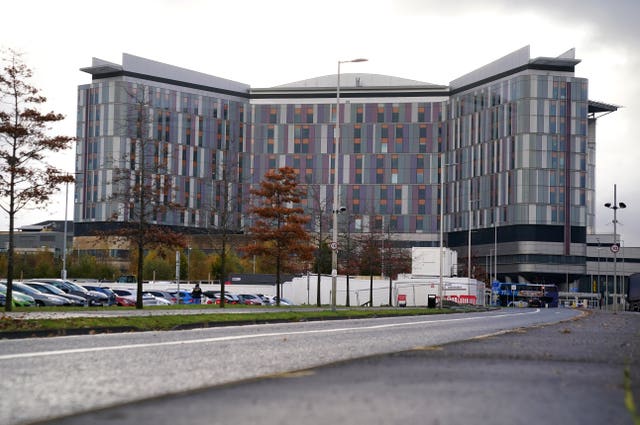A specialist has defended her decisions around the delivery of a baby who died a week after birth and said managing it differently could have lost another life, an inquiry heard.
Freya Murphy died on July 28, 2018 in the neonatal intensive care unit at the Queen Elizabeth University Hospital in Glasgow, seven days after she was born.
A fatal accident inquiry (FAI) at Glasgow Sheriff Court into her death has heard her mother Karen Murphy, 32, a teacher from Cambuslang, South Lanarkshire, was moved on to a “red pathway” on the morning of July 21 after previously being deemed low-risk.
Giving evidence on Wednesday, Dr Marianne Ledingham said every room in the maternity ward was full and there were “insufficient” staff when she arrived on the Saturday morning for the on-call shift.
She told the inquiry Mrs Murphy was top of her list due to concerns from Dr Felicity Watson, but there were “competing priorities” due to another woman, Patient A, who also needed to be delivered quickly.
Giving evidence, she said she “intended” to intervene due to the handover but did not as, on assessment, she believed Freya would be delivered “imminently”.
She told the inquiry Mrs Murphy had requested “minimal intervention” and she reassured the first-time mother she would return in 10 minutes if Freya had not been delivered.
Dr Ledingham said she carried out a vaginal examination at 9.04am and found Freya was in the posterior position, meaning the baby’s head may not have fitted through the pelvis, and performed a manual rotation without anaesthetic to “expediate delivery as quickly as possible”.
The specialist said she left to accompany Patient A for theatre delivery due to NHS Greater Glasgow and Clyde guidelines and there were insufficient staff to have two theatre deliveries.
She told the inquiry theatre transfer could take an hour and may not have meant Freya was delivered earlier.
Dr Ledingham said that if she had carried out a vaginal delivery at 8.43am it may not have changed the outcome but “tragically there could have been an adverse outcome in Patient A’s baby as well”.
She told the inquiry she thinks about the case “every day”.
She disputed previous inquiry evidence from midwife Helen Kidd over whether concerns were raised around the cardiotocograph, and said forceps were not used as Mrs Murphy had not had an epidural, the inquiry heard.

“I think it’s very easy to say ‘yes there was opportunity for delivery at that time’ – the question is would it have made any difference? I have to be honest, I don’t think it would have made any difference.
“Whenever there is an assessment of adverse outcome I think there’s a tendency to focus on one case. Had I not intervened in Patient A at that time, tragically there could have been an adverse outcome in Patient A’s baby as well.
“We are looking at this horrible tragic outcome for Freya and have to remember there were other patients I needed to intervene in urgently at the same time.”
Under cross-examination, Dr Ledingham said staffing levels were “inadequate for patient safety”. She said consultants were required to attend hospital for four hours on an on-call weekend shift and could leave if it was not busy.
Dr Ledingham said: “Adequate staffing would have comprised additional midwives able to open a second theatre, an additional anaesthetic consultant, an additional registrar.
“I do not consider there was adequate staffing. I do not believe there was adequate staffing to ensure patient safety.”
She said that during a weekday, one of the theatres would have been used for elective C-sections while another team would have been available to open a second theatre in an emergency, and there would have been another consultant working, the inquiry heard.
Dr Ledingham said: “Why should it be the case to have different staff from the week? It doesn’t make sense, emergencies happen out-of-hours and at the weekend.
“During that on-call shift I stayed in the building for 12 hours, it was extremely busy. I was in theatre several times during the day dealing with emergency C-sections, my recollection was I didn’t eat anything or go to the toilet, it was completely hectic.”
The inquiry continues in front of Sheriff Barry Divers.






